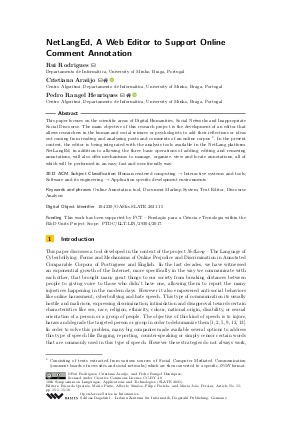NetLangEd, A Web Editor to Support Online Comment Annotation
Authors
Rui Rodrigues,
Cristiana Araújo  ,
Pedro Rangel Henriques
,
Pedro Rangel Henriques 
-
Part of:
Volume:
10th Symposium on Languages, Applications and Technologies (SLATE 2021)
Part of: Series: Open Access Series in Informatics (OASIcs)
Part of: Conference: Symposium on Languages, Applications and Technologies (SLATE) - License:
 Creative Commons Attribution 4.0 International license
Creative Commons Attribution 4.0 International license
- Publication Date: 2021-08-10
File

PDF
OASIcs.SLATE.2021.15.pdf
- Filesize: 1.75 MB
- 16 pages
Document Identifiers
Subject Classification
ACM Subject Classification
- Human-centered computing → Interactive systems and tools
- Software and its engineering → Application specific development environments
Keywords
- Online Annotation tool
- Document Markup System
- Text Editor
- Discourse Analysis
Metrics
- Access Statistics
-
Total Accesses (updated on a weekly basis)
0Document
0Metadata
Abstract
This paper focuses on the scientific areas of Digital Humanities, Social Networks and Inappropriate Social Discourse. The main objective of this research project is the development of an editor that allows researchers in the human and social sciences or psychologists to add their reflections or ideas out coming from reading and analyzing posts and comments of an online corpus . In the present context, the editor is being integrated with the analysis tools available in the NetLang platform. NetLangEd, in addition to allowing the three basic operations of adding, editing and removing annotations, will also offer mechanisms to manage, organize, view and locate annotations, all of which will be performed in an easy, fast and user-friendly way.
Cite As Get BibTex
Rui Rodrigues, Cristiana Araújo, and Pedro Rangel Henriques. NetLangEd, A Web Editor to Support Online Comment Annotation. In 10th Symposium on Languages, Applications and Technologies (SLATE 2021). Open Access Series in Informatics (OASIcs), Volume 94, pp. 15:1-15:16, Schloss Dagstuhl – Leibniz-Zentrum für Informatik (2021)
https://doi.org/10.4230/OASIcs.SLATE.2021.15
BibTex
@InProceedings{rodrigues_et_al:OASIcs.SLATE.2021.15,
author = {Rodrigues, Rui and Ara\'{u}jo, Cristiana and Henriques, Pedro Rangel},
title = {{NetLangEd, A Web Editor to Support Online Comment Annotation}},
booktitle = {10th Symposium on Languages, Applications and Technologies (SLATE 2021)},
pages = {15:1--15:16},
series = {Open Access Series in Informatics (OASIcs)},
ISBN = {978-3-95977-202-0},
ISSN = {2190-6807},
year = {2021},
volume = {94},
editor = {Queir\'{o}s, Ricardo and Pinto, M\'{a}rio and Sim\~{o}es, Alberto and Portela, Filipe and Pereira, Maria Jo\~{a}o},
publisher = {Schloss Dagstuhl -- Leibniz-Zentrum f{\"u}r Informatik},
address = {Dagstuhl, Germany},
URL = {https://drops.dagstuhl.de/entities/document/10.4230/OASIcs.SLATE.2021.15},
URN = {urn:nbn:de:0030-drops-144325},
doi = {10.4230/OASIcs.SLATE.2021.15},
annote = {Keywords: Online Annotation tool, Document Markup System, Text Editor, Discourse Analysis}
}
Author Details
- Centro Algoritmi, Departamento de Informática, University of Minho, Braga, Portugal
Funding
This work has been supported by FCT - Fundação para a Ciência e Tecnologia within the R&D Units Project Scope: PTDC/LLT-LIN/29304/2017.
References
-
Raphael Cohen-Almagor. Countering hate on the internet. Annual Review of Law and Ethics, 2014.

-
Karmen Erjavec. "You don't understand, this is a new war!" Analysis of hate speech in news web sites' comments. Mass Communication and Society, 2012.

-
Nor Fariza, Hazita Azman, and Afendi Hamat. Investigating students' use of online annotation tool in an online reading environment. 3L: Language, Linguistics, Literature, 19:87-101, 2013.

-
Ian Glover, Zhijie Xu, and Glenn Hardaker. Online annotation - research and practices. Computers & Education, 49(4):1308-1320, 2007.

-
David John Harvey. Dangerous speech - some legislative proposals. SSRN Electronic Journal, 2019.

-
Anjali Jindia and Sonal Chawla. Annotations in e-learning. International Journal of Computers & Technology, 12:3852-3859, 2013.

-
Ricardo Kawase, Eelco Herder, and Wolfgang Nejdl. A comparison of paper-based and online annotations in the workplace. In Learning in the Synergy of Multiple Disciplines. EC-TEL 2009. Lecture Notes in Computer Science, pages 240-253, 2009.

-
Jingyan Lu and Liping Deng. Examining students’ use of online annotation tools in support of argumentative reading. Australasian Journal of Educational Technology, 2013.

-
Silvana Neshkovska and Zorica Trajkova. The essentials of hate speech. International Journal of Education TEACHER, 2017.

-
Chikashi Nobata, Joel Tetreault, Achint Thomas, Yashar Mehdad, and Yi Chang. Abusive language detection in online user content. Proceedings of the 25th International Conference on World Wide Web - WWW '16, 2016.

-
Ilia A. Ovsiannikov, Michael A. Arbib, and Thomas H. McNeill. Annotation technology. International Journal of Human-Computer Studies, 50(4):329-362, 1999.

-
Alexandra A. Siegel. Social Media and Democracy: The State of the Field, Prospects for Reform, pages 56-88. Cambridge University Press, 2020.

-
Stefanie Ullmann and Marcus Tomalin. Quarantining online hate speech: technical and ethical perspectives. Ethics and Information Technology, 2019.

-
Joanna Wolfe and CM Neuwirth. From the margins to the center - the future of annotation. Journal of Business and Technical Communication, 2001.

